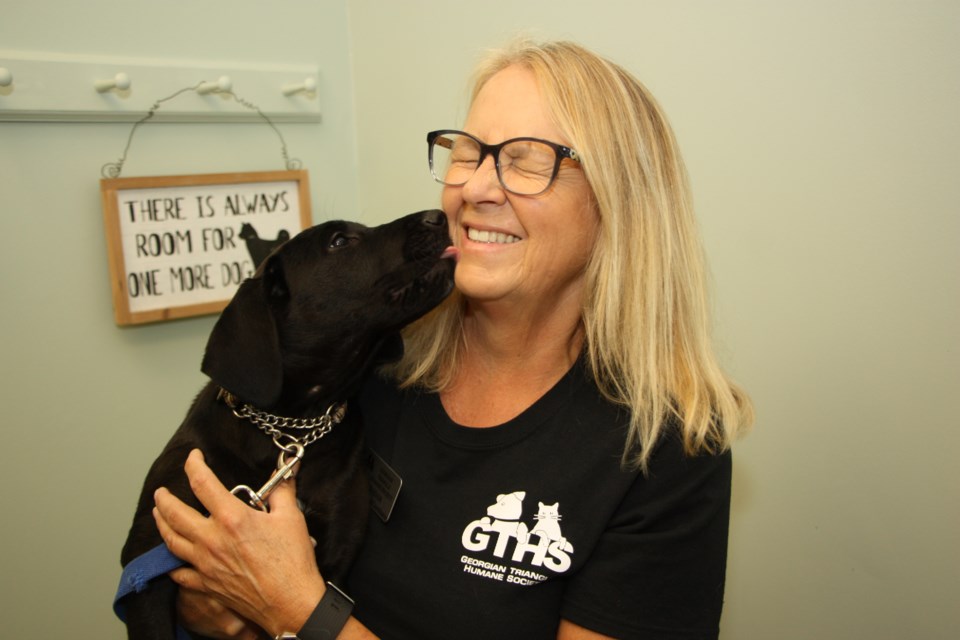Sometimes a dog travels thousands of miles for a chance at a forever home.
The chances are pretty good in Collingwood.
This year alone 28 dogs from Manitoba and another two from Northern Ontario made the trip to Collingwood and have been adopted into local homes.
The Georgian Triangle Humane Society (GTHS) has extended its reach recently to take in northern dogs looking for homes.
“We have more adopters than we have available dogs,” said Pamela Odam, canine outreach coordinator at the GTHS.
While GTHS makes sure it has a place for a dog in the community that needs a new home, they are using the available resources to help dogs outside the community.
Over the years, GTHS has developed a relationship with K9 Advocates Manitoba, a non-profit organization devoted to assisting rural First Nation communities in Manitoba with ongoing canine overpopulation issues.
The organization is a non-traditional rescue and operates many initiatives to assist the communities, including dog shelters for the winter, spay and neuter clinics and education in dog care. The organization will also take dogs out of the community when asked to find them new homes. That’s where GTHS comes in.
Some of the dogs that leave Manitoba are flown to Ontario – accompanied by a human companion who volunteers for the flight – and arrive at GTHS to find a new home.
Most recently a female dog named Hanna arrived in Collingwood with her two pups Libby and Maddox. The names are given to the dogs most often by the human travel companions.
Maddox was named by Odam’s son who said the all-black puppy reminded him of the black labs his grandfather kept. Maddox was his grandfather’s family name.
“It’s a great initiative,” said Odam. “A lot of the dogs are puppies. The moms will give birth in dumps or dumpsters and the pups don’t all survive. In some communities there are packs of dogs that can get vicious.”
In many rural First Nation communities that receive assistance from K9 Advocates Manitoba, the residents are concerned with feeding their families, finding clean water and establishing education in the community for the kids.
“These communities have higher priorities than funding spay/neuter clinics,” said Odam.
In fact, K9 Advocates Manitoba is also working to petition the Manitoba and Canadian governments to develop bylaws and veterinary care programs to support communities, which will in turn improve lives for stray dogs and help end overpopulation.
In Northern Ontario, the Ontario Society for the Prevention of Cruelty to Animals (OSPCA) has established a new program that includes outreach to rural Ontario communities where dog-overpopulation has become an issue. The OSPCA, with permission from the community runs spay/neuter clinics and will take dogs out of the community for adoption by request from the dog owner or community leaders. Two members of the GTHS team recently completed a trip to Sudbury to help with the OSPCA northern dogs program.
According to Odam, most dogs from northern Ontario and Manitoba are mixed-breed large dogs. They get several puppies, which always generate interest from the community.
“We had 25 applications for six puppies,” said Odam.
Since then GTHS has received more puppies, but hasn’t exhausted those applicants yet.
The puppies are typical, they need to be house trained, leash trained and obedience trained.
An adult northern dog coming to the area for adoption typically has no leash manners, according to Odam.
“They have either been tied up or been allowed to roam freely,” said Odam. “They don’t know how to play with a toy, but they are very social dogs. They’ve been part of a community so they are comfortable around people and dogs.”
As it is for all dogs adopted from the GTHS, the northern dogs are seen by a veterinarian, spayed or neutered, and screened for disease.
Maddox has already been spoken for, but Libby is still up for adoption. The pup’s mom Hanna is also available for adoption. Click here for more information on the GTHS adoption process.
Click here for a CBC documentary on K9 Advocates Manitoba.
